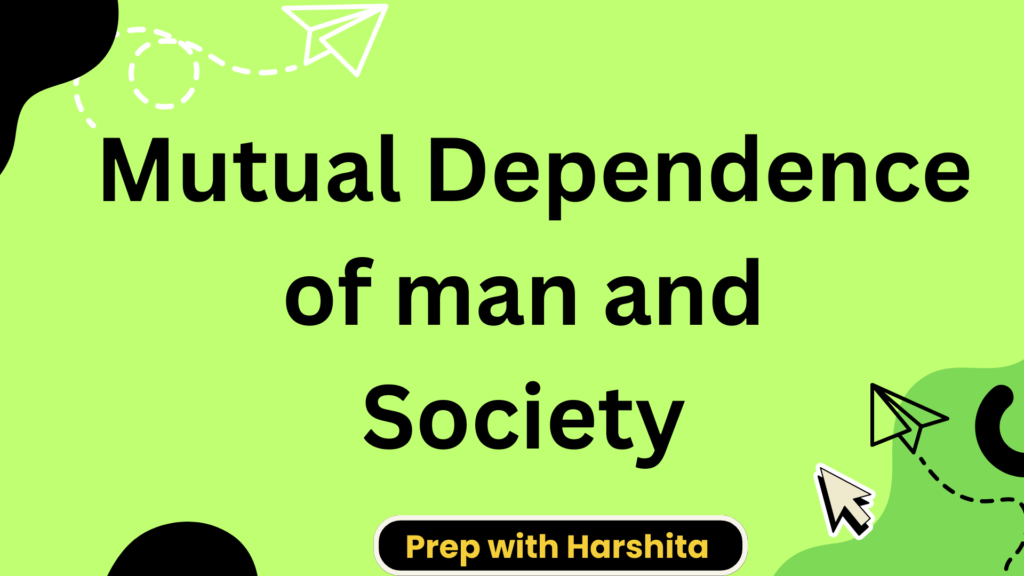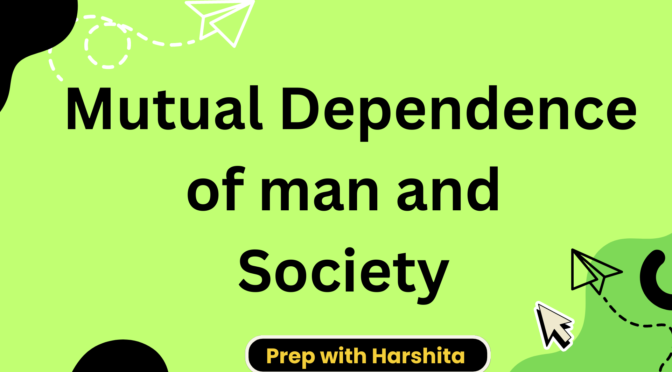The mutual dependence of man and society refers to the reciprocal relationship between individuals and the social structures and institutions that surround them. It recognizes that individuals are shaped by society, and society, in turn, is constructed and sustained by individuals.
Here are some key aspects of the mutual dependence of man and society:
- Socialization: Society plays a crucial role in shaping individuals through a process called socialization. From early childhood, individuals learn societal norms, values, and behaviors through interactions with family, education, media, and other social institutions. These socializing agents influence individuals’ beliefs, attitudes, and actions, shaping their identities and guiding their behaviors within the social context.
- Interconnectedness: Individuals are inherently social beings, and their well-being and development are interconnected with others in society. Human beings rely on social interactions, relationships, and cooperation for their physical, emotional, and intellectual needs. Social connections provide support, nurture, and opportunities for growth and fulfillment, influencing individuals’ overall happiness and quality of life.
- Division of Labor and Specialization: Society relies on the division of labor, where individuals specialize in different occupations and roles. Through this division, individuals contribute their unique skills, knowledge, and abilities to the collective functioning of society. The interdependence of different occupations and roles creates an interconnected web of social relationships and cooperation necessary for the smooth functioning of society as a whole.
- Social Institutions and Structures: Social institutions, such as the family, education, economy, and government, are created and sustained by individuals to meet the collective needs of society. These institutions provide frameworks, rules, and systems that regulate social behavior, coordinate collective actions, and maintain social order. Individuals both shape and are shaped by these institutions, as they interact with and operate within their established norms and structures.
- Cultural Transmission: Society preserves and transmits its cultural heritage, knowledge, beliefs, and practices across generations. Individuals contribute to the preservation and evolution of culture by passing on traditions, customs, and values to future generations. At the same time, individuals’ actions and interactions contribute to the dynamic nature of culture, influencing its adaptation and transformation over time.
- Social Change: Society is not static; it evolves and changes over time. Individuals play a vital role in driving social change through their ideas, actions, and collective movements. Movements for social justice, human rights, and political reforms are often initiated by individuals who recognize the need for change and work towards it. Society, in turn, responds to these movements, adapting its structures and norms to address the evolving needs and aspirations of its members.
- Identity and Belonging: Individual identity is shaped by social factors, including cultural, ethnic, and gender identities, as well as social roles and group affiliations. Individuals derive a sense of belonging and identity from their participation in social groups, communities, and societies. At the same time, individuals contribute to the construction of collective identities through their shared values, norms, and collective actions.
The mutual dependence of man and society highlights the intricate relationship between individuals and the social context in which they live. Individuals both shape and are shaped by society, and their actions, beliefs, and choices influence the functioning, development, and transformation of society as a whole. Recognizing this interdependence is crucial for understanding human behavior, promoting social cohesion, and addressing societal challenges.
Also Read: Gender school and society

Also Visit: Prep with Harshita


I don’t think the title of your article matches the content lol. Just kidding, mainly because I had some doubts after reading the article.
Velocidad critica
Equipos de calibración: importante para el desempeño fluido y eficiente de las maquinarias.
En el mundo de la tecnología moderna, donde la rendimiento y la estabilidad del aparato son de gran importancia, los aparatos de equilibrado tienen un función fundamental. Estos aparatos dedicados están creados para equilibrar y asegurar partes móviles, ya sea en maquinaria de fábrica, transportes de traslado o incluso en dispositivos domésticos.
Para los expertos en mantenimiento de sistemas y los técnicos, utilizar con dispositivos de equilibrado es fundamental para asegurar el desempeño estable y fiable de cualquier mecanismo dinámico. Gracias a estas herramientas tecnológicas modernas, es posible reducir considerablemente las movimientos, el sonido y la presión sobre los cojinetes, extendiendo la vida útil de partes costosos.
Igualmente significativo es el papel que desempeñan los aparatos de ajuste en la soporte al cliente. El apoyo profesional y el soporte permanente utilizando estos dispositivos posibilitan ofrecer asistencias de óptima nivel, incrementando la agrado de los clientes.
Para los titulares de proyectos, la aporte en sistemas de ajuste y sensores puede ser importante para aumentar la rendimiento y rendimiento de sus dispositivos. Esto es particularmente importante para los emprendedores que administran modestas y pequeñas empresas, donde cada detalle es relevante.
También, los dispositivos de calibración tienen una gran utilización en el campo de la protección y el supervisión de estándar. Permiten encontrar potenciales defectos, reduciendo mantenimientos caras y problemas a los dispositivos. Además, los resultados obtenidos de estos aparatos pueden aplicarse para maximizar procedimientos y incrementar la exposición en plataformas de investigación.
Las sectores de implementación de los dispositivos de balanceo comprenden múltiples áreas, desde la fabricación de transporte personal hasta el seguimiento ambiental. No importa si se trata de grandes fabricaciones industriales o limitados espacios de uso personal, los equipos de ajuste son indispensables para proteger un rendimiento productivo y libre de fallos.
[b]How to Prevent Dangerous Imbalance and Extend Equipment Lifespan?[/b]
Vibration issues in industrial machinery lead to increased wear, higher energy costs, and unexpected failures. [b]Balanset-1A[/b] is a professional portable balancer and vibration analyzer designed to detect and correct imbalance in rotors, fans, turbines, and other rotating equipment.
[b]Why choose Balanset-1A?[/b]
– High-precision vibration diagnostics
– Easy-to-use software
– Compact and portable design
– Two kit options to meet your needs:
[url=https://www.amazon.es/dp/B0DCT5CCKT]Full Kit on Amazon[/url]: Balanset-1A device, Vibration sensors, Software & mounting accessories, Hard carrying case
Price: [b]2250€[/b]
[url=https://www.amazon.es/dp/B0DCT5CCKT][img]https://i.postimg.cc/SXSZy3PV/4.jpg[/img][/url]
[url=https://www.amazon.es/dp/B0DCT4P7JR]OEM Kit on Amazon[/url]: Balanset-1A device, Basic sensors, Software
Price: [b]1978€[/b]
[url=https://www.amazon.es/dp/B0DCT4P7JR][img]https://i.postimg.cc/cvM9G0Fr/2.jpg[/img][/url]
Ensure longer equipment lifespan and reduce costly downtime with [b]Balanset-1A[/b].